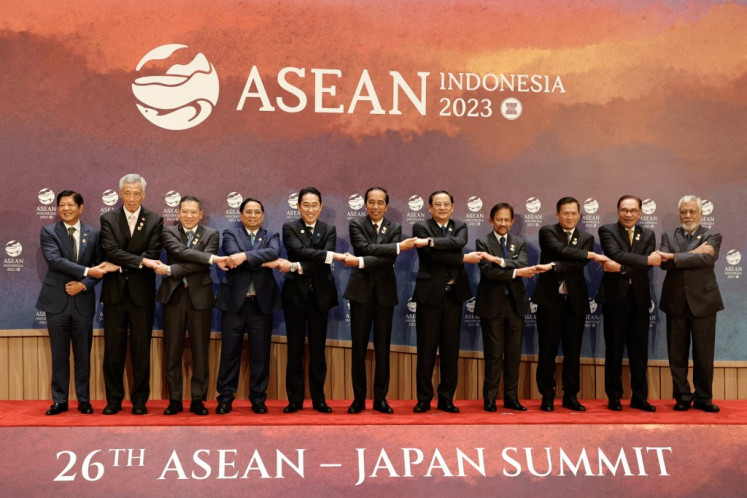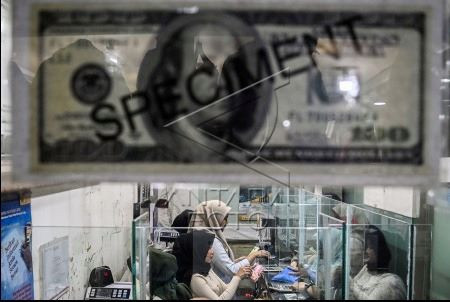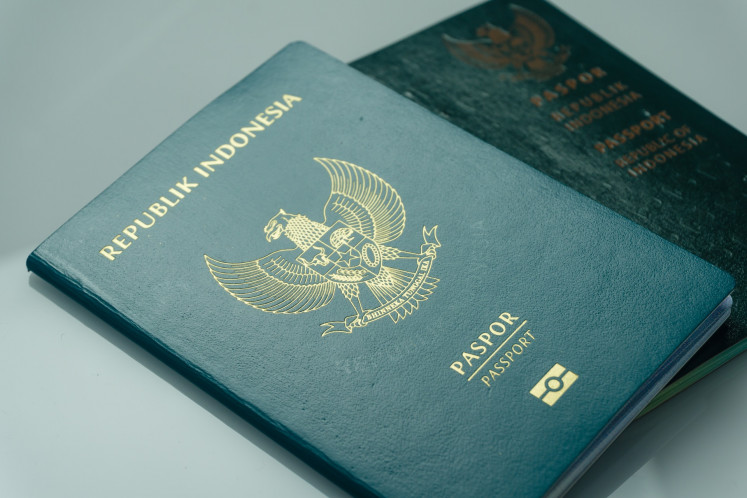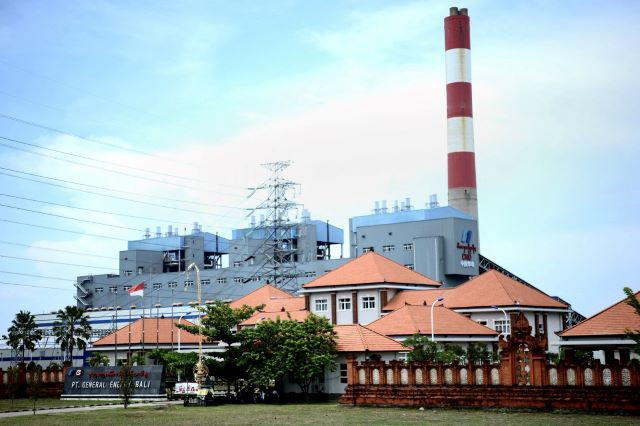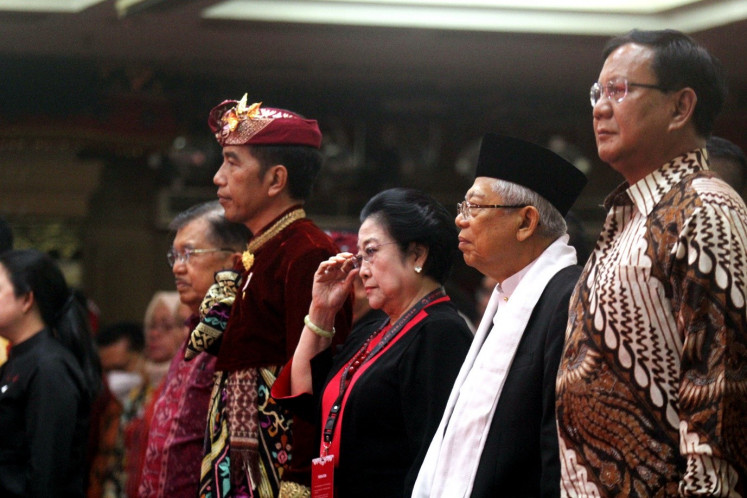When Biden torpedoes Japan’s dream trade bloc
Biden announced his IPEF initiative because he knew that Capitol Hill was not in the mood to support any trade bloc or exclusive economic cooperation, because it would be damaging to the US workforce.
Change Size
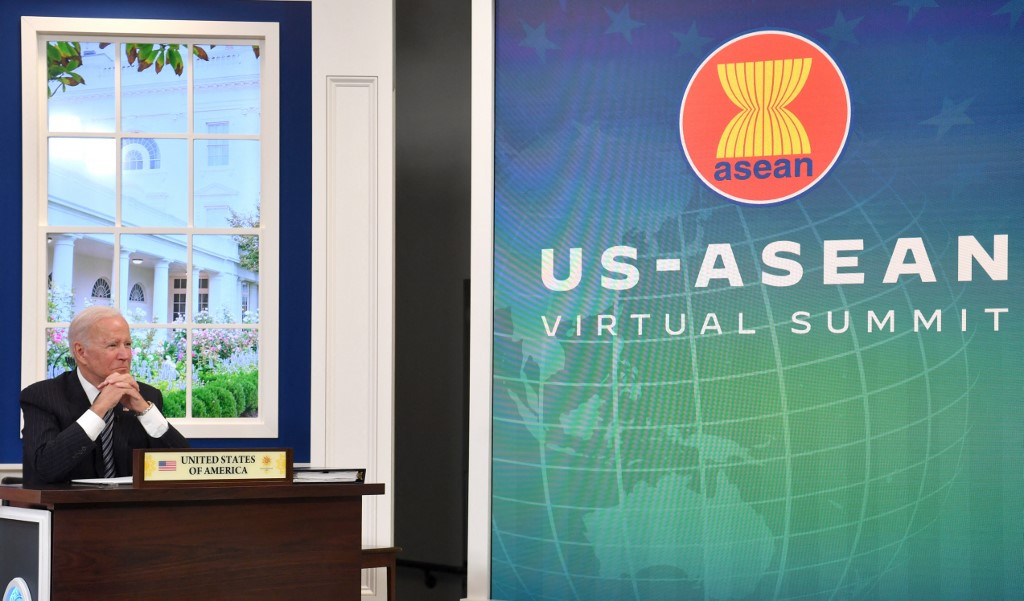 US President Joe Biden participates virtually in the annual ASEAN Summit from the South Court Auditorium of the White House in Washington, DC, on Oct. 26, 2021. (AFP/Nicholas Kamm)
US President Joe Biden participates virtually in the annual ASEAN Summit from the South Court Auditorium of the White House in Washington, DC, on Oct. 26, 2021. (AFP/Nicholas Kamm)
A
diplomat from an East Asian country recently asked me whether Indonesia is interested in joining the Indo-Pacific Economic Framework (IPEF) which United Sates President Joe Biden introduced during the East Asia Summit last October. As the largest member of the 10-member ASEAN, Indonesia’s stand on that matter is important for other countries, the diplomat said.
“I think Indonesia will be very careful in responding to Biden’s initiative,” I replied without prior thinking. I was surprised by his unexpected question.
The Indonesian media, unfortunately, have paid little attention to Biden’s proposed framework. They were, and are still, too busy with the COVID-19 pandemic, the controversy stemming from the intention of several political parties (of course the government is happy with the idea) to delay the elections, which have been set for Feb. 14, 2024, or the discourse over allowing President Joko “Jokowi” Widodo to serve a third term.
Biden announced his IPEF initiative because he knew that Capitol Hill was not in the mood to support any trade bloc or exclusive economic cooperation, because it would be damaging to the US workforce.
Indonesia, too, has little appetite to talk about any new trade bloc, as it played a pivotal role in the creation of the ASEAN-led Regional Comprehensive Economic Partnership (RCEP) which has been in force since Jan. 1 for members that have ratified it.
The world’s largest trade bloc comprises all the 10 ASEAN members, China, Japan, South Korea, Australia and New Zealand. The US is not a member, while India opted to pull out in order to protect its national economy.
The 15-member RCEP accounts for 30 percent of the global population and 30 percent of global gross domestic product. The House of Representatives, unfortunately, missed the Jan. 1 deadline for ratification of the pact and Indonesia is unable to enjoy the benefits of the free trade agreement.
Then-US president Barack Obama initiated the 12-member Trans-Pacific Partnership (TPP), but the country never joined it. In 2017, Obama’s successor, Donald Trump, withdrew from the bloc. Australia, Brunei, Canada, Chile, Japan, Malaysia, Mexico, New Zealand, Peru, Singapore and Vietnam remain.
From the very beginning, Indonesia refused to join the TPP because the main objective of the trade agreement was to contain China, Indonesia’s most important trading partner.
With strong backing from his Australian counterpart Malcolm Turnbull, then-Japanese prime minister Shinzo Abe initiated the shift of TPP into the Comprehensive and Progressive Trans-Pacific Partnership (CPTPP). The agreement was signed on March 8, 2018 in Santiago, without changing the team lineup.
Many hoped Trump would change his mind, but the US president scolded Japan, Australia and other CPTPP members, saying the US deserved more benefits from the multilateral partnership.
In January last year, then-Japanese prime minister Yoshihide Suga said China under President Xi Jinping did not suit the CPTPP due to its sophisticated standards. The statement was intended to lure the US, under Biden, back to the trade pact, but to no avail.
Just one day after Australian Prime Minister Scott Morrison, United Kingdom Prime Minister Boris Johnson, and President Biden established the trilateral security pact AUKUS on Sept. 15, 2021, President Xi surprisingly announced China’s intention to join the CPTPP. Morrison was quick to cold shoulder Xi’s bid.
A few months ago I attended a webinar with Australian scholars and officials. They boasted that Beijing did not qualify for the CPTPP despite its status as the world’s second-largest economy after the US.
On Jan. 21 of this year, during their first official teleconference, Biden told Japanese Prime Minister Fumio Kishida about the IPEF, meaning that the CPTPP would only become a piece of history. The game is over for the CPTPP if the IPEF materializes.
Speaking of the IPEF in his speech at the online East Asian Summit on Oct. 27, 2021, Biden believed the initiative would restore American leadership in the Indo-Pacific and adapt its role for the 21st century.
Through the Indo-Pacific economic framework, the US will:
* develop new approaches to trade that meet high labor and environmental standards
* govern our digital economies and cross-border data flows according to open principles, including through a new digital economy framework
* advance resilient and secure supply chains that are diverse, open and predictable
* make shared investments in decarbonization and clean energy
* promote free, fair, and open trade and investment through the Asia-Pacific Economic Cooperation (APEC), including in the US 2023 host year, and
* close the region’s infrastructure gap through Build Back Better World with Group of Seven partners
Biden’s decision also means that two American presidents, Trump and Biden, successively slapped Japan in the face. But still, according to the Associated Press, Kishida supported Biden’s IPEF and promised to work to build support for the initiative in the region.
Japan chose to forgive Biden for “officially killing” the CPTPP because China is too powerful and frightening to be faced by Japan alone. Multilateral security cooperation will be more effective in confronting the world’s second-most powerful economy.
In the meantime, the US, Japan, Australia and India formed the loose military security pact, Quad, to contain China especially in the Indo-Pacific region. Such a mission is doomed to fail, however.
The Quad leaders agreed on Thursday to prevent the invasion of an independent state like Ukraine from happening in the Indo-Pacific. Clearly the four-country grouping was referring to Taiwan, a self-ruled island claimed by China that has stepped up its alert level since Russia's invasion of Ukraine, wary of Beijing taking advantage of a distracted West to move against it.
I do not know what is in Biden’s mind with his IPEF. He may think the trade cooperation will be enough to lure ASEAN members to work together to alienate China.
For Indonesia, however, the IPEF is just another ploy after the TPP and CPTPP to fight China, which is why it will never join.
***
The writer is senior editor at The Jakarta Post.






